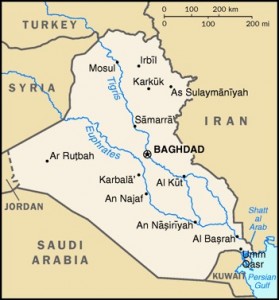Only six months after the US military withdrew from Iraq, the country is plagued by violence and extreme corruption that threatens to weaken the state and strengthen violent insurgent groups.
 About 234 people were killed in Iraq in the month of June, the second deadliest month since December of last year, mostly by suicide bombings and car bombings by al-Qaeda’s branch in the country, an outgrowth of the US war there.
About 234 people were killed in Iraq in the month of June, the second deadliest month since December of last year, mostly by suicide bombings and car bombings by al-Qaeda’s branch in the country, an outgrowth of the US war there.
“The state is almost paralyzed and dysfunctional due to political feuds. In such circumstances, the security forces also will be paralyzed and the insurgents groups are making use of this chaos,” Haider al-Saadi, the Shiite owner of internet cafe in eastern Baghdad, told the Associated Press on Saturday. “I do not think that al-Qaida is getting any stronger – it is the state that is getting weaker.”
After months of political strife, Iraqi Prime Minister Nouri al-Maliki has threatened to call for early elections which could tighten his grip on power due to the Shiite leader’s harsh efforts to marginalize his political opponents.
“When the other party is refusing to sit down at the negotiating table and insists on the policy of creating continued crises,” Maliki said, “then the prime minister finds himself obliged to call for early elections in which the Iraqi people will have the final say.”
But the impasse between the political factions he refers to is largely of his own making. Maliki’s sectarian drive towards authoritarianism has all the factions – Shiites, Sunnis and Kurds alike – calling for his resignation. Even the influential fellow Shiite leader Moqtadr al-Sadr has joined the chorus.
And as far as letting “the Iraqi people have the final say,” Maliki is simply telling lies. Just this week, the Maliki regime ordered the closure of over 40 news media outlets in a move that signaled Iraq’s complete lack of press freedom.
“It is a government message to the media outlets that if you are not with us, then you are against us,” said Ziyad al-Aajely, the head of the Journalistic Freedoms Observatory.
Prime Minister Nouri al-Maliki has tried to purge the government of his political rivals – mainly Sunnis – and consolidate power in a drive to dictatorship, all with U.S. support. He has detained his political opponents, tortured hundreds, cracked down on press freedoms, etc.
The Obama administration has kept largely quiet about Maliki’s behavior, aside from about $2 billion in annual aid and tens of billions in military assistance to support this drive to authoritarianism. While this keeps the halls of power in Washington and the oil corporations happy, even the best case scenarios are damning for Iraqi citizens as well as the geopolitics of the region.
The enduring effects of the illegal US war in Iraq are still causing havoc and bloodshed throughout the country. Iraq is neither secure, nor is it a democracy as was promised by warmongers in Washington.


